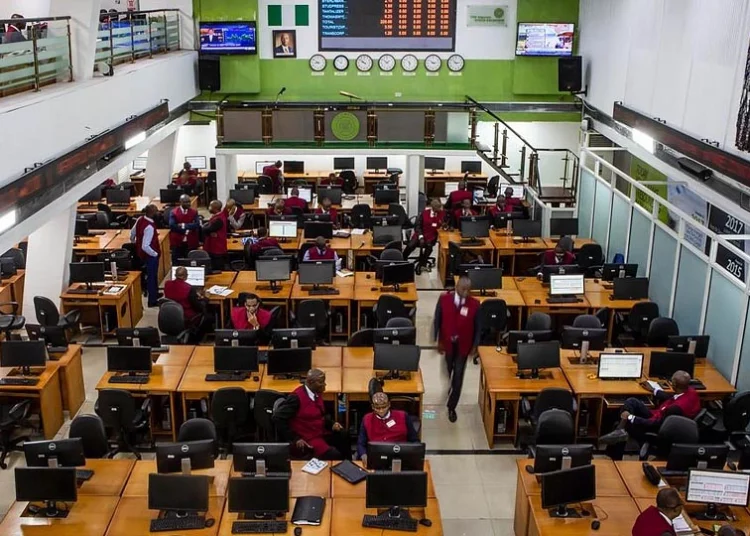Investors in the Nigerian equities market rallied gains of N1.807 trillion in the month of May, 2022.
The market capitalisation gained by N1.807 trillion to close at N28.568 trillion on May 31, 2022 from N26.761 trillion at which it opened for trading activities for the month. Also, the overall market performance measure All-Share Index (ASI), which tracks the general market movement of all listed equities on the Exchange, rose by 6.23 per cent to close at 52,990.28 points in the fifth month of the year.
Also, sector performance was bullish during the month as most indices closed the period on uptrend as at March 27, 2022. NGX Consumer Goods index appreciated the most by 7.45 per cent. NGX Lotus II index followed with a gain of 6.19 per cent, while NGX 30 index rose by 5.18 per cent.
Others are; NGX Oil & Gas, NGX Premium Board, NGX Industrial Goods and NGX Pension indices went up by 5.17 per cent, 4.70 per cent, 4.28 per cent and 2.02 per cent, respectively. On the other side, NGX Insurance and NGX Bankin indices recorded month-to-month decline of 6.62 per cent and 1.69 per cent respectively, as at March 27, 2022.
Financial analysts attributed market performance in the period review to better-than-expected corporate earnings, higher dividend payouts, and positive macro-economic data to support the buying sentiment.
The CEO, Wyoming Capital & Partners, Mr. Tajudeen Olayinka noted that, improved liquidity in the stock market can be traced to 2021 performance by listed companies and improved performance by many of them in the first quarter 2022 results.
He added that, “Increased local investors participation in the market, and reinvestment of 2021 annual dividends by investors who received such dividend payments recently from listed companies.
“Liquidity overhang that is making it practically difficult for investors in the fixed income space to factor in current high inflation rate to the yields obtainable in the market. The negative real return in the fixed income market had forced some of these investors to embrace the equity market as an alternative investment class, before the recent 13 per cent hike in Monetary Policy Rate (MPR) by MPC of CBN. Even with the hike in MPR, we still have some traditional investors showing interest in equity market, which is known to readily adjust to inflation from time to time. Equity market is an inflation adjusting market.”
Analysts at United Capital Plc said: “So far this year, we have witnessed a clear case of divergence between the domestic and global equity markets. At the close of trading on May 31, 2022, the NGX-All Share Index Year-to-Date (YTD) had returned 24.1 per cent and is currently over the psychological 50,000-level for the first time since the 2008 crash, as opposed to the broad-based bearish performance experienced in other markets.”
They noted that, “at the forefront of the rally in Nigerian equities have been domestic investors who have executed 79.6 per cent of all equity transactions on the local bourse YTD, according to data from the Nigerian Exchange. The uptrend has been particularly driven by domestic institutional investors whose investment options have now been somewhat limited to the equities market.
“Since the turn of Q2, 2022, yields on domestic bonds have trended higher, causing Pension Fund Administrators (PFAs) to book mark-to-market losses (particularly those that mark-to-market their bond portfolios) on their bond positions (which constitutes c.60.0 per cent of their portfolios). Meanwhile, alternative outlets like Fixed deposits and Nigerian Treasury Bills (NT-bills) have continued to remain unattractive.
“On the other hand, we have seen listed companies return solid results in the Q1, 2022 earnings season. As a result, we have seen these institutional investors increase exposure to domestic equities, while reducing bond and other money market exposures.”
On market outlook, the chief operating officer of InvestData Consulting Limited, Mr Ambrose Omordion stressed that, “we expect a mixed trend in reaction to March year-end earnings report, as funds flow to the fixed income market on the rate hike by Central Bank of Nigeria (CBN). Just as portfolio rotations persist as market players digest the macro-economic data and Q1 corporate earnings release, ahead of March year-end 2022 audited financials with dividend announcements to support uptrend in the new month amid the rebound in oil prices.
“Also, the market continues to interpret the rising inflation in relation to the crude oil price and other factors, in the midst of profit-taking and portfolio rebalancing. This will result in market players targeting fundamentally sound and dividend-paying stocks in the hope of dividend announcements.”





